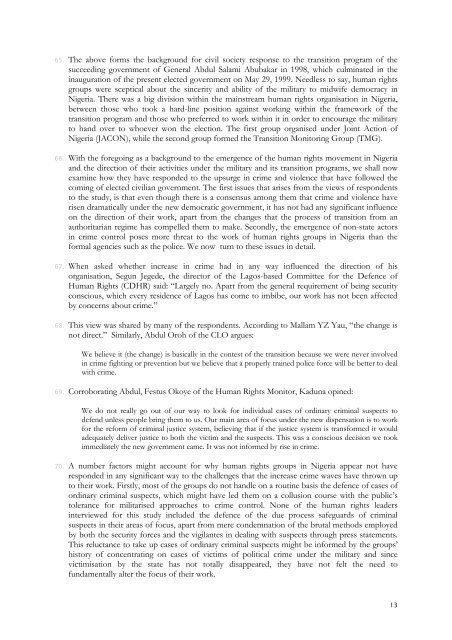114 - Nigeria - Crime and Human Rights Shettima, Kole - The ICHRP
114 - Nigeria - Crime and Human Rights Shettima, Kole - The ICHRP
114 - Nigeria - Crime and Human Rights Shettima, Kole - The ICHRP
Create successful ePaper yourself
Turn your PDF publications into a flip-book with our unique Google optimized e-Paper software.
65. <strong>The</strong> above forms the background for civil society response to the transition program of the<br />
succeeding government of General Abdul Salami Abubakar in 1998, which culminated in the<br />
inauguration of the present elected government on May 29, 1999. Needless to say, human rights<br />
groups were sceptical about the sincerity <strong>and</strong> ability of the military to midwife democracy in<br />
<strong>Nigeria</strong>. <strong>The</strong>re was a big division within the mainstream human rights organisation in <strong>Nigeria</strong>,<br />
between those who took a hard-line position against working within the framework of the<br />
transition program <strong>and</strong> those who preferred to work within it in order to encourage the military<br />
to h<strong>and</strong> over to whoever won the election. <strong>The</strong> first group organised under Joint Action of<br />
<strong>Nigeria</strong> (JACON), while the second group formed the Transition Monitoring Group (TMG).<br />
66. With the foregoing as a background to the emergence of the human rights movement in <strong>Nigeria</strong><br />
<strong>and</strong> the direction of their activities under the military <strong>and</strong> its transition programs, we shall now<br />
examine how they have responded to the upsurge in crime <strong>and</strong> violence that have followed the<br />
coming of elected civilian government. <strong>The</strong> first issues that arises from the views of respondents<br />
to the study, is that even though there is a consensus among them that crime <strong>and</strong> violence have<br />
risen dramatically under the new democratic government, it has not had any significant influence<br />
on the direction of their work, apart from the changes that the process of transition from an<br />
authoritarian regime has compelled them to make. Secondly, the emergence of non-state actors<br />
in crime control poses more threat to the work of human rights groups in <strong>Nigeria</strong> than the<br />
formal agencies such as the police. We now turn to these issues in detail.<br />
67. When asked whether increase in crime had in any way influenced the direction of his<br />
organisation, Segun Jegede, the director of the Lagos-based Committee for the Defence of<br />
<strong>Human</strong> <strong>Rights</strong> (CDHR) said: “Largely no. Apart from the general requirement of being security<br />
conscious, which every residence of Lagos has come to imbibe, our work has not been affected<br />
by concerns about crime.”<br />
68. This view was shared by many of the respondents. According to Mallam YZ Yau, “the change is<br />
not direct.” Similarly, Abdul Oroh of the CLO argues:<br />
We believe it (the change) is basically in the contest of the transition because we were never involved<br />
in crime fighting or prevention but we believe that a properly trained police force will be better to deal<br />
with crime.<br />
69. Corroborating Abdul, Festus Okoye of the <strong>Human</strong> <strong>Rights</strong> Monitor, Kaduna opined:<br />
We do not really go out of our way to look for individual cases of ordinary criminal suspects to<br />
defend unless people bring them to us. Our main area of focus under the new dispensation is to work<br />
for the reform of criminal justice system, believing that if the justice system is transformed it would<br />
adequately deliver justice to both the victim <strong>and</strong> the suspects. This was a conscious decision we took<br />
immediately the new government came. It was not informed by rise in crime.<br />
70. A number factors might account for why human rights groups in <strong>Nigeria</strong> appear not have<br />
responded in any significant way to the challenges that the increase crime waves have thrown up<br />
to their work. Firstly, most of the groups do not h<strong>and</strong>le on a routine basis the defence of cases of<br />
ordinary criminal suspects, which might have led them on a collusion course with the public’s<br />
tolerance for militarised approaches to crime control. None of the human rights leaders<br />
interviewed for this study included the defence of the due process safeguards of criminal<br />
suspects in their areas of focus, apart from mere condemnation of the brutal methods employed<br />
by both the security forces <strong>and</strong> the vigilantes in dealing with suspects through press statements.<br />
This reluctance to take up cases of ordinary criminal suspects might be informed by the groups’<br />
history of concentrating on cases of victims of political crime under the military <strong>and</strong> since<br />
victimisation by the state has not totally disappeared, they have not felt the need to<br />
fundamentally alter the focus of their work.<br />
13
















